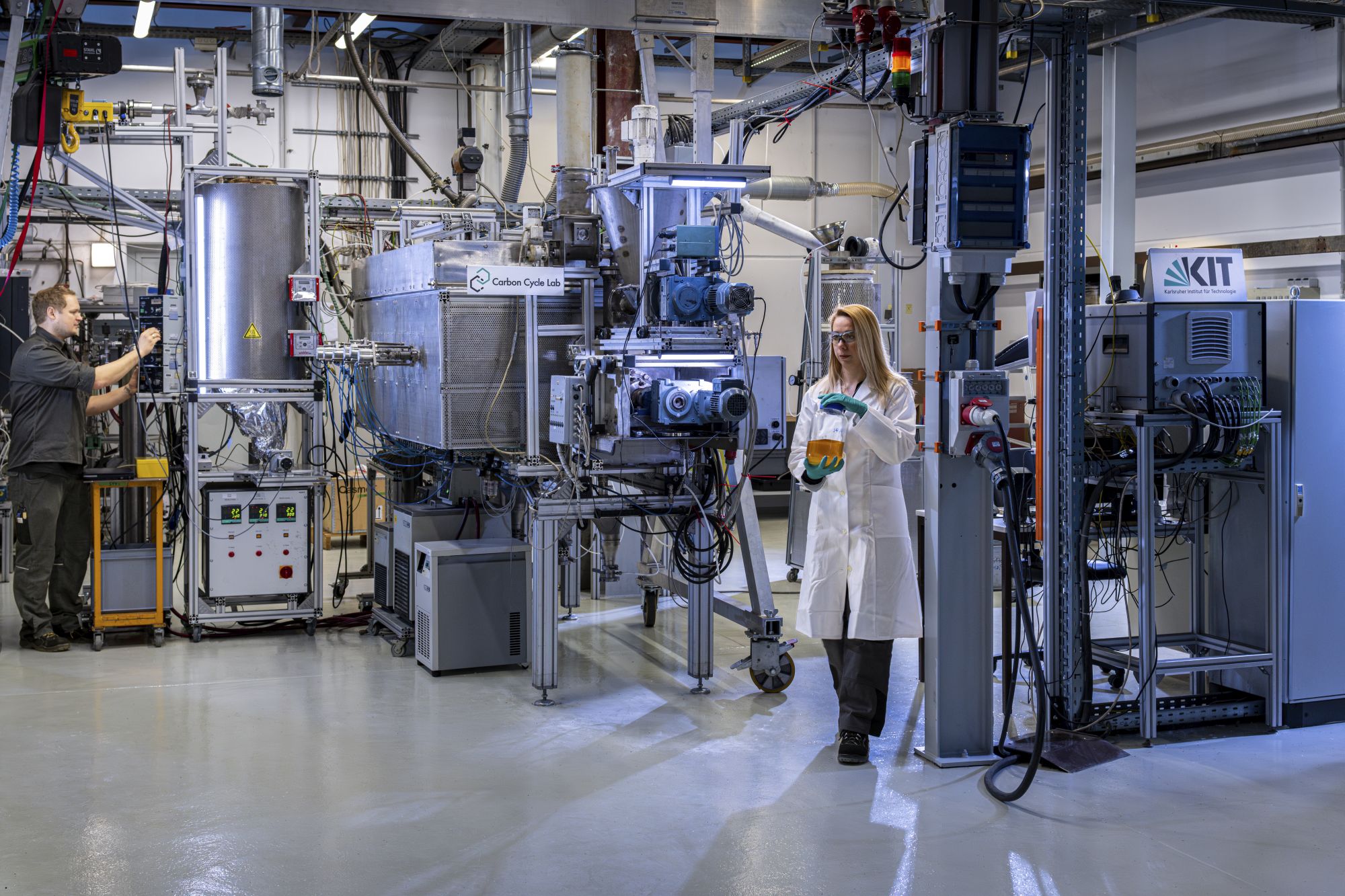Rising energy costs, scarce resources, growing amounts of waste – mankind has a waste problem. With the Carbon Cycle Lab (CCLab), researchers at the Karlsruhe Institute of Technology (KIT) have created a new development platform for a more sustainable circular economy. Among other things, the chemical recycling of plastic waste is being researched and transferred to pilot scale. The aim is to reintroduce previously non-recyclable waste into the material cycle.
Karlsruhe/Germany, March 4, 2025 Global plastics production has risen sharply over the last 70 years – to around 414 million tonnes in 2023. The recycling rate is ten per cent. Energy costs are set to rise and resources will become scarcer. In the spirit of transformation, the aim is therefore to achieve higher recycling rates. KIT is contributing to this with the new Carbon Cycle Lab (CCLab) research platform. Previously, KIT researchers had already succeeded in developing a complete recycling process for biological residues with the bioliq® project. The CCLab extends this work to the chemical recycling of plastic waste.
‘For a climate-neutral circular economy, we need to return waste from industry and commerce, from households and from agriculture and forestry back into the material cycle and use renewable energies to do so,’ says Professor Dieter Stapf, Head of the Institute of Technical Chemistry at KIT. Closing the carbon cycle protects the environment and saves scarce resources. ‘We are a country where energy and raw materials are scarce and expensive,’ says Stapf. ‘Our future raw materials are waste. Recycling them is efficient and cheap. Recycling helps us to become less dependent on imports of fossil fuels, which has become particularly urgent in light of the Ukraine crisis.’
The Carbon Cycle Lab benefits from bioliq® findings
KIT is already conducting extensive research into the use of biogenic residues and renewable raw materials for the production of sustainable chemical products and fuels. In the bioliq® project completed at the end of last year, researchers and partners set up a pilot plant with which it was possible to produce petrol from straw on a tonne scale for the first time. ‘We are taking a lot of what we learnt from bioliq® to the CCLab,’ says Professor Frederik Scheiff, Head of the Chemical Energy Carriers Department at the Engler-Bunte Institute at KIT.
‘In the last operating campaign, we were able to convert plastic oils into chemical raw materials for the first time, thereby demonstrating the prospects for the future. Nobody has managed to do this before,’ says Scheiff. ‘We have learnt how to develop and scale up such technologies, and we have been able to show that they can also be used to convert complex, previously non-recyclable plastic waste into chemical raw materials.’
Utilising previously non-recyclable waste
The new CCLab research platform is a logical continuation of the process of utilising waste materials that began with bioliq®. Due to their chemical composition and impurities, the majority of plastic products today cannot be recycled to a high standard. ‘At the CCLab, we are working on recycling what is currently incinerated or landfilled and thus generates greenhouse gas emissions,’ says Stapf. The new technologies developed at KIT make it possible to ultimately synthesise new plastics from plastic waste without using crude oil or natural gas. The pollutants and impurities contained are destroyed or separated. The products are then further processed into raw materials for the production of new plastics. Researchers want to demonstrate the entire value chain in the CCLab. ‘The Carbon Cycle Lab is an important development platform for the sustainable circular economy. Here we are transferring new technologies from research at KIT and in the Helmholtz Association to pilot scale,’ says Stapf.
Great need for recycling
Such technologies are urgently needed: The EU’s recycling targets stipulate that an additional ten million tonnes of plastics per year will be recycled across Europe by 2035. For Germany, which produces a third of all plastics in Europe, this would mean two to three million tonnes more per year, emphasises Stapf: ‘With the European Green Deal, the European Union wants to create the transition to a resource-efficient, climate-neutral and competitive economy. The CCLab provides important insights into how this can work on an industrial scale.’
Among others, the Institute of Catalysis Research and Technology, the Engler-Bunte Institute and the Institute of Technical Chemistry are involved in the CCLab at KIT. There are also technology transfer co-operations with many industrial companies. The federal government funds the research platform as part of the Helmholtz Association.
As ‘The Research University in the Helmholtz Association’, KIT creates and imparts knowledge for society and the environment. The aim is to make significant contributions to global challenges in the fields of energy, mobility and information. To this end, around 10,000 employees work together on a broad disciplinary basis in the natural sciences, engineering, economics, humanities and social sciences. KIT prepares its 22,800 students for responsible tasks in society, business and science through research-orientated university studies. Innovation activities at KIT bridge the gap between knowledge and application for the benefit of society, economic prosperity and the preservation of our natural resources. KIT is one of the German universities of excellence.
Further information:
(https://www.elab.kit.edu/cclab.php)
(https://www.energie.kit.edu/)
ImageSource
KIT, Markus Breig, Im Carbon Cycle Lab wird unter anderem das chemische Recycling von Kunststoffabfällen erforscht und in den Pilotmaßstab überführt.


